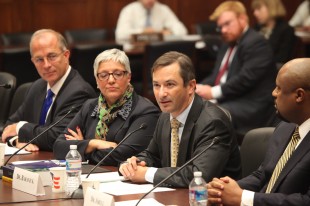OpenStax founder tells U.S. House Subcommittee on Higher Education how Rice University is providing free textbooks to college students
Richard Baraniuk, the founder of Rice’s Connexions and OpenStax College, testified about college affordability Sept. 18 at the U.S. House Subcommittee on Higher Education and Workforce Training hearing, “Keeping College Within Reach: Improving Access and Affordability Through Innovative Partnerships.”
Baraniuk, Rice’s Victor E. Cameron Professor of Engineering, told lawmakers that the high and rapidly increasing cost of traditional textbooks is a significant barrier for many college or would-be college students.

Witnesses before the committee included, from left, Jeffrey Docking, president of Adrian College; Paula Singer, president and chief executive officer of Laureate Global Products and Services in Baltimore; Baraniuk; and Charles Lee Isbell Jr., professor and senior associate dean, College of Computing, Georgia Institute of Technology. Photo courtesy: U.S. House Subcommittee on Higher Education and Workforce Training
“According to the (Government Accountability Office), first-time, full-time college students spent an average of $886 at two-year public colleges on books and supplies in 2003-2004, the equivalent of 72 percent of their tuition and fees,” Baraniuk said. “In some locales — California community colleges, for example — the cost of textbooks now exceeds the cost of tuition. No wonder a recent survey found that 70 percent of college students forgo buying texts, even though 78 percent of those students believe they will perform worse in the course.”
Baraniuk described how Rice’s OpenStax College is responding to the crisis by providing free, peer-reviewed textbooks for some of the nation’s most-attended college courses. OpenStax College’s growing catalog includes titles for introductory physics, sociology, anatomy and both majors and nonmajors biology. He said the books have been adopted by educators at more than 335 institutions representing about 50,000 students at community colleges, four-year colleges and research universities.
Baraniuk told the subcommittee that OpenStax plans to add six new titles over the next 18 months. He also described how Rice and its philanthropic partners — including the William and Flora Hewlett Foundation, the Bill and Melinda Gates Foundation and the Laura and John Arnold Foundation — pay the costs of authoring, marketing and maintaining the books.
“In return for the foundations’ venture philanthropic investment, OpenStax College aims to make returns in terms of student savings,” Baraniuk told Congress. “The return on investment can be dramatic. With even modest market penetration, free, high-quality textbooks can produce benefits many times the value of an equivalent sum invested in scholarships. A one-time investment to create a textbook produces student savings year after year; a scholarship must be funded annually. More specifically, assuming just a 10 percent market share, the 25-title OpenStax College library will save 1.2 million students over $120 million every year.”
Baraniuk’s full testimony is available at:
http://edworkforce.house.gov/uploadedfiles/baraniuk_writtentestimony_final.pdf


Leave a Reply